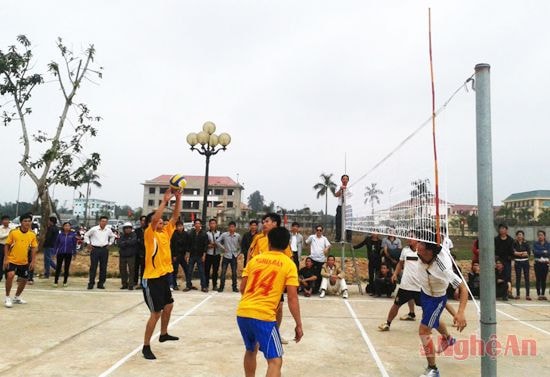Developing grassroots sports movement in Nghia Dan
(Baonghean) - The mountainous ethnic minority sports competition took place in Quy Hop district in mid-April 2015, Nghia Dan delegation ranked 4th out of 11 mountainous districts. The most interesting thing was that the district's women's volleyball team surpassed Quy Hop - the number 1 candidate for the championship to step up to the highest position.
Mr. Luong Ba Vien, Director of the Cultural and Sports Center of Nghia Dan district, said: “In previous ethnic minority sports competitions, Nghia Dan athletes achieved high results in crossbow shooting and stick pushing. Recently, sports such as football and volleyball have also developed vigorously and widely in the district and achieved high results…”.
 |
| Volleyball competition in early spring 2015 in Nghia Dan district. |
Going to the football and volleyball fields in Nghia Son, Nghia Lam, Nghia Loi communes, etc., the atmosphere is very crowded and bustling. On the field, the athletes compete enthusiastically and carefree; outside, hundreds of fans cheer enthusiastically. Mr. Truong Van Hai - a volleyball player of Nghia Son commune confided: "Every day, after hours of hard work, young people in the village invite each other to the field to play volleyball. The volleyball movement is very popular with the people, many people are willing to contribute money to support and encourage the village's football team to practice and compete".
According to statistics from the Department of Culture, Sports and Tourism of Nghia Dan district, more than 26% of the population regularly practices sports. Sports such as football, volleyball, tug of war, stick pushing, crossbow shooting, athletics, stilt walking, chess, etc. attract a large number of participants from all walks of life. On average, each commune annually organizes 2-3 commune-level tournaments on the occasion of early spring and national holidays. Leading the mass sports movement of the district are localities such as Nghia Binh, Nghia Hoi, Nghia Son, Nghia Lam, Nghia Minh, Nghia Mai, etc.
Every afternoon, the sports grounds of the villages here become crowded and fun with exciting football and volleyball matches. On occasions when the village has wedding parties, housewarming parties, etc., there are always exciting volleyball matches. The sports grounds not only help people improve their physical strength and health but also connect and promote solidarity between the Thai, Tho, Kinh ethnic groups as well as between the villages in the district. In addition, from the football and volleyball fields in the whole district, the sports movement has developed widely, greatly changing the face of the countryside, gradually reducing social evils...
Currently, the whole Nghia Dan district has hundreds of football, volleyball, badminton, crossbow shooting, and pole pushing teams. The achievements of Nghia Dan athletes are also increasingly improved in provincial tournaments. At the 7th Provincial Sports Festival in 2014, with 4 gold medals, 4 silver medals and 6 bronze medals, Nghia Dan district ranked 13th out of 23 delegations and 4th out of 11 mountainous districts participating in the festival - the best achievement ever of the district. Ms. Truong Thi Hong - an athlete who has represented the district many times in pole pushing competitions, confided: "Thanks to the attention of the District Cultural and Sports Center, ethnic minority athletes like us have been able to practice and participate in district and provincial tournaments. Participating in tournaments, we have the opportunity to meet and interact with athletes from other districts, exchanging many valuable experiences in sports as well as in life".
However, the development of grassroots sports in Nghia Dan still faces many difficulties. Besides the limited financial resources in a mountainous locality, the problem of physical facilities for physical training is also a huge obstacle. Currently, all communes and towns in Nghia Dan have not met the standards for cultural and sports facilities, especially sports grounds. Out of 25 communes and towns, only 11 communes have stadiums that meet the area requirements, the remaining 9 communes have stadiums but not enough area and up to 6 communes do not have stadiums. Currently, the number of hamlets with cultural houses and hamlet stadiums with enough area is only 58.8%. For example, in Nghia Loi commune, up to 5/10 hamlets have sports grounds that do not have enough area of 200m2. Nghia Dan town also faces similar difficulties as it only has a town stadium, while in the blocks, only 2 out of 14 hamlets have stadiums of 200m2 as required. Other communes such as Nghia Long, Nghia Trung, Nghia Tho ... are also in a similar situation.
Mr. Le Thanh Son, Head of the Department of Culture and Sports of Nghia Dan district said: "Although there are still many difficulties, in recent times, all levels and sectors from the district to the commune and town have always attached importance to developing the sports movement, creating conditions for the mass sports movement of localities to develop, thereby contributing to improving the quality of cultural life at the grassroots level, meeting the needs of the people. In addition, the district also focuses on local sports strengths, creating conditions for sports clubs to operate effectively, linking community cultural activities with sports activities.
In the coming time, the district will continue to promote the development of infrastructure for cultural, informational and sports activities associated with new rural construction, striving to have 70% or more communes with cultural and sports centers, 100% of residential areas with playgrounds and training grounds attached to cultural houses; restore and develop traditional sports and ethnic sports; continue to promote the movement of socializing resources to build infrastructure for sports activities and organize sports tournaments from the commune level; encourage and create conditions for the establishment and maintenance of sports clubs and sports families; focus on creating resources and training district-level athletes in the direction of professionalization to further improve achievements at provincial-level tournaments".
Minh Quan
